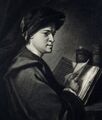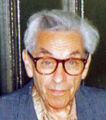Template:Selected anniversaries/March 26: Difference between revisions
No edit summary |
No edit summary |
||
| (28 intermediate revisions by the same user not shown) | |||
| Line 1: | Line 1: | ||
<gallery> | <gallery> | ||
File:Nathaniel Bowditch.jpg|link=Nathaniel Bowditch (nonfiction)|1773: American captain and mathematician [[Nathaniel Bowditch (nonfiction)|Nathaniel Bowditch]] born. He will be a founder of modern maritime navigation; his book ''The New American Practical Navigator'', first published in 1802, will be carried on board every commissioned U.S. Naval vessel. | File:Nathaniel Bowditch.jpg|link=Nathaniel Bowditch (nonfiction)|1773: American captain and mathematician [[Nathaniel Bowditch (nonfiction)|Nathaniel Bowditch]] born. He will be a founder of modern maritime navigation; his book ''The New American Practical Navigator'', first published in 1802, will be carried on board every commissioned U.S. Naval vessel. | ||
File:John Mudge.jpg|link=John Mudge (nonfiction)|1793: Physician and engineer [[John Mudge (nonfiction)|John Mudge]] dies. He was the first self-proclaimed civil engineer, and often regarded as the "father of civil engineering". | File:John Mudge.jpg|link=John Mudge (nonfiction)|1793: Physician and engineer [[John Mudge (nonfiction)|John Mudge]] dies. He was the first self-proclaimed civil engineer, and often regarded as the "father of civil engineering". | ||
File:George Chrystal.jpg|link=George Chrystal (nonfiction)|1851: Mathematician [[George Chrystal (nonfiction)|George Chrystal]] born. He will be awarded a Gold Medal from the Royal Society of London (confirmed shortly after his death) for his studies of [[Seiche (nonfiction)|seiches]] (wave patterns in large inland bodies of water). | File:George Chrystal.jpg|link=George Chrystal (nonfiction)|1851: Mathematician [[George Chrystal (nonfiction)|George Chrystal]] born. He will be awarded a Gold Medal from the Royal Society of London (confirmed shortly after his death) for his studies of [[Seiche (nonfiction)|seiches]] (wave patterns in large inland bodies of water). | ||
File:Paul Erdős.jpg|link=Paul Erdős (nonfiction)|1913: Mathematician and academic [[Paul Erdős (nonfiction)|Paul Erdős]] born. He will firmly believe mathematics to be a social activity, living an itinerant lifestyle with the sole purpose of writing mathematical papers with other mathematicians. | File:Paul Erdős.jpg|link=Paul Erdős (nonfiction)|1913: Mathematician and academic [[Paul Erdős (nonfiction)|Paul Erdős]] born. He will firmly believe mathematics to be a social activity, living an itinerant lifestyle with the sole purpose of writing mathematical papers with other mathematicians. | ||
</gallery> | </gallery> | ||
Latest revision as of 08:17, 26 March 2022
1773: American captain and mathematician Nathaniel Bowditch born. He will be a founder of modern maritime navigation; his book The New American Practical Navigator, first published in 1802, will be carried on board every commissioned U.S. Naval vessel.
1793: Physician and engineer John Mudge dies. He was the first self-proclaimed civil engineer, and often regarded as the "father of civil engineering".
1851: Mathematician George Chrystal born. He will be awarded a Gold Medal from the Royal Society of London (confirmed shortly after his death) for his studies of seiches (wave patterns in large inland bodies of water).
1913: Mathematician and academic Paul Erdős born. He will firmly believe mathematics to be a social activity, living an itinerant lifestyle with the sole purpose of writing mathematical papers with other mathematicians.



